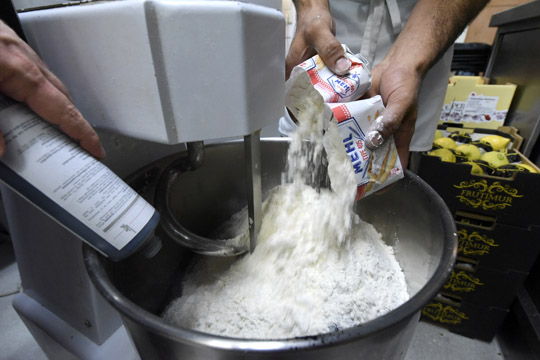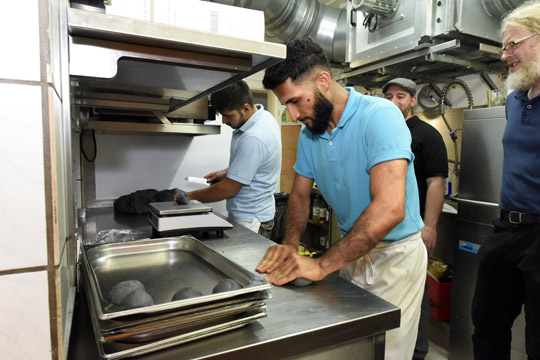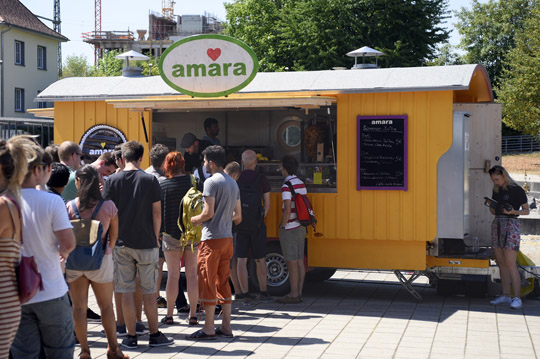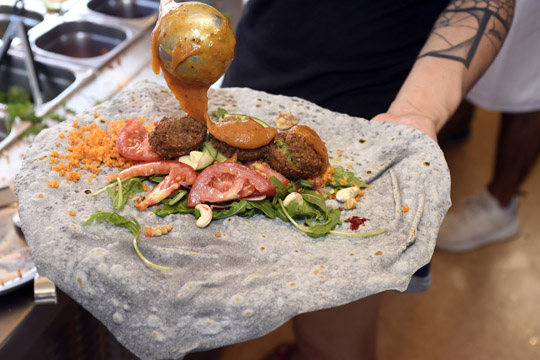One Lou, Please, and Two Linas
Freiburg, Jul 26, 2018
Anyone who is studying knows about yufkas. And it's likely the healthy, fast-food snack bar "Amara" on Engelbergerstraße is acquainted with them, too. University of Freiburg students have developed three new yufkas in cooperation with Amara and "Hakuna Matata," a local company that makes tasty, gourmet treats. Their names are Lina, Morti, and Lou. They are the fillings that are wrapped in the bread. The economist Prof. Dr. Stephan Lengsfeld and psychologist Steffen Weyreter of the University of Freiburg are leading the eleven-member group taking part in the seminar, "Campus UnternehmerTUN," which translates loosely to "Campus Entrepreneurs DO IT." The mission is to go through every phase of a start-up, step-by-step. The group calls itself "Stephf's Eleven." The team is taking the challenge seriously. They've gone the distance with their fast food truck, making stops at the Freiburg Protestant University of Applied Sciences, the Sports Institute, and the Faculty of Engineering as well as the Rectorate on Fahnenbergplatz. Annette Hoffmann went along for the ride.
 Discussing flyer design with partner company Amara in Freiburg's Stühlinger district are (from the right) lecturer Steffen Weyreter, Amara owner Eylem Gül, and students Fabian Herrmann and Sophia Dams. Corporate identity is key here. "Amara goes Black" is written on matching black t-shirts and flyer. "Black" refers to the dough. A small amount of activated charcoal gives it its dark color. It makes just the right frame for the fruity, summery goodies inside.
Discussing flyer design with partner company Amara in Freiburg's Stühlinger district are (from the right) lecturer Steffen Weyreter, Amara owner Eylem Gül, and students Fabian Herrmann and Sophia Dams. Corporate identity is key here. "Amara goes Black" is written on matching black t-shirts and flyer. "Black" refers to the dough. A small amount of activated charcoal gives it its dark color. It makes just the right frame for the fruity, summery goodies inside.
Photo: Thomas Kunz
 Stephan Lengsfeld (front) works with a melon. He bisects it, spoons out the seeds, cuts off the ends, and peels and dices it. Twenty kilograms of cantaloupe melon are prepared in this way. Later they'll be in the yufka that goes by the name of Morti.
Stephan Lengsfeld (front) works with a melon. He bisects it, spoons out the seeds, cuts off the ends, and peels and dices it. Twenty kilograms of cantaloupe melon are prepared in this way. Later they'll be in the yufka that goes by the name of Morti.
Photo: Thomas Kunz
 Maybe it's time to be brave and open the bag of flour from the middle for the next batch. A few grams of activated charcoal are added to every ten kilos of flour. A dozen lemons are at the ready in crates. They'll later prevent the melon from discoloring and add a bit of sour to the cantaloupe's sweet.
Maybe it's time to be brave and open the bag of flour from the middle for the next batch. A few grams of activated charcoal are added to every ten kilos of flour. A dozen lemons are at the ready in crates. They'll later prevent the melon from discoloring and add a bit of sour to the cantaloupe's sweet.
Photo: Thomas Kunz
 Each portion of dough that will become a yufka weighs exactly 120 grams. Allocating the work is the name of the game. One person cuts and weighs the dough. Another rolls it into balls.
Each portion of dough that will become a yufka weighs exactly 120 grams. Allocating the work is the name of the game. One person cuts and weighs the dough. Another rolls it into balls.
Photo: Thomas Kunz
 The team is relaxed ahead of the rush (from the left): Steffen Weyreter, Zaher Hami, Stephan Lengsfeld, Eylem Gül, Jennifer Kurz.
The team is relaxed ahead of the rush (from the left): Steffen Weyreter, Zaher Hami, Stephan Lengsfeld, Eylem Gül, Jennifer Kurz.
Photo: Thomas Kunz
 And now for a quiz question: How long does the line at least have to be to promote increased demand? And what's the longest it can be before it frightens away potential customers? It's time to eat at the Faculty of Engineering.
And now for a quiz question: How long does the line at least have to be to promote increased demand? And what's the longest it can be before it frightens away potential customers? It's time to eat at the Faculty of Engineering.
Photo: Thomas Kunz
 It takes a bit of practice and lots of feeling to make the dough into a flatbread. Vedat Karayilan in the Amara food truck.
It takes a bit of practice and lots of feeling to make the dough into a flatbread. Vedat Karayilan in the Amara food truck.
Photo: Thomas Kunz
 Meet Lina. The berries are the only thing that's missing here. Raspberries and cranberries give this yufka a fruity bouquet and taste of summer.
Meet Lina. The berries are the only thing that's missing here. Raspberries and cranberries give this yufka a fruity bouquet and taste of summer.
Photo: Thomas Kunz
 Morti's cashew nuts make this yufka one with a satisfying crunch. And what else does Morti have on offer? Chicken – or seitan in the vegan version – melon, arugula salad, red onions, and a red beet cream spread from Hakuna Matata. Photo: Thomas Kunz
Morti's cashew nuts make this yufka one with a satisfying crunch. And what else does Morti have on offer? Chicken – or seitan in the vegan version – melon, arugula salad, red onions, and a red beet cream spread from Hakuna Matata. Photo: Thomas Kunz
 Last but not least, there's Lou, Chakka Lakka sauce from Hakuna Matata makes a creamy crown for Lou's red beans, cucumbers, onions, bulgur, and chicken. It's a tasteful upgrade for every yufka.
Last but not least, there's Lou, Chakka Lakka sauce from Hakuna Matata makes a creamy crown for Lou's red beans, cucumbers, onions, bulgur, and chicken. It's a tasteful upgrade for every yufka.
Photo: Thomas Kunz

